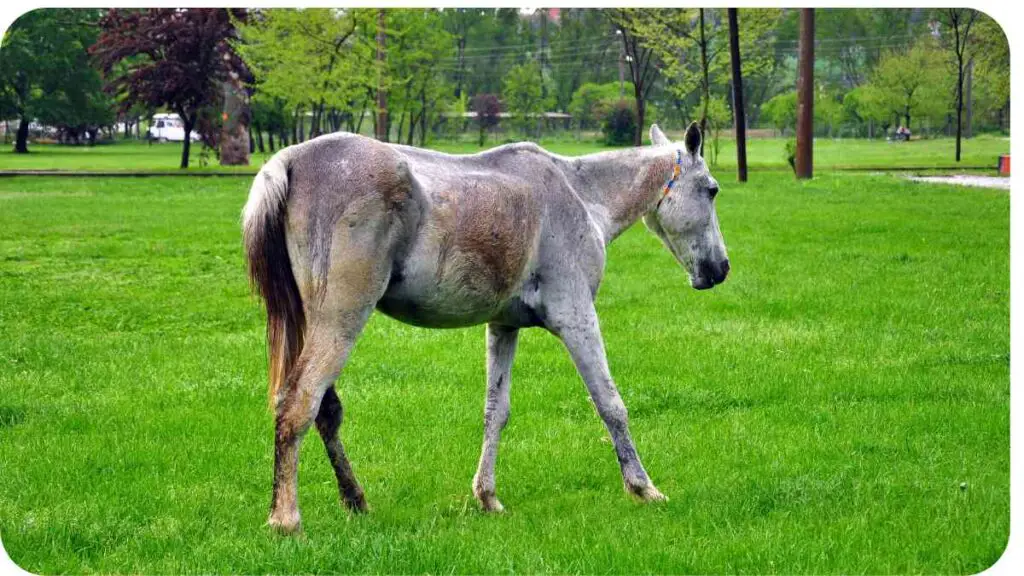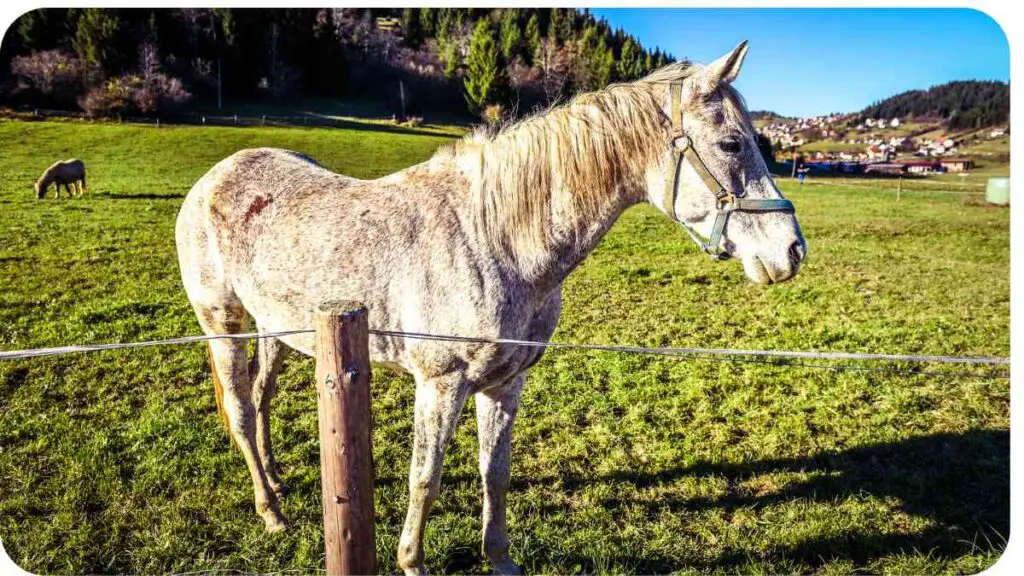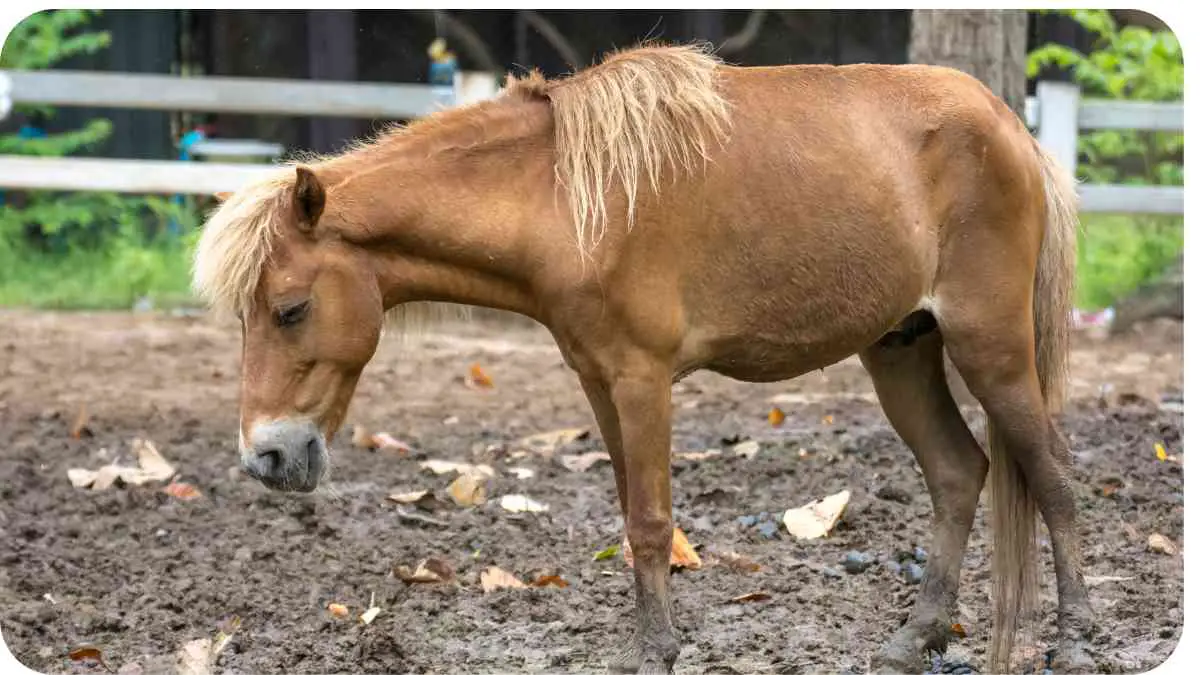As a horse owner, it can be distressing to notice that your beloved equine companion is losing weight. A horse’s weight loss can be attributed to various underlying factors, ranging from gastrointestinal disorders to dental problems, parasites, nutritional deficiencies, and stress.
In this article, we will explore the common causes of weight loss in horses, discuss the effects of these factors on their overall health, and provide effective solutions to help your horse regain weight and thrive.
| Takeaways |
| Weight loss in horses can be caused by various factors such as gastrointestinal disorders, dental problems, parasites, nutritional deficiencies, and stress. |
| Regular dental care and monitoring can help address dental problems that contribute to weight loss. |
| Implementing a parasite control program, including regular deworming, is essential to prevent weight loss caused by parasites. |
| Ensuring a well-balanced diet with the right amounts of protein, vitamins, minerals, fiber, and fat is crucial for maintaining a healthy weight in horses. |
| Minimizing stress through a calm environment, consistent training, and social interaction can help prevent stress-related weight loss. |
| Regular monitoring of weight and progress, along with consultation with a veterinarian, is necessary to effectively manage weight loss in horses. |
Common Causes of Weight Loss in Horses
Table 1 outlines the common causes of weight loss in horses, enabling you to identify possible underlying factors affecting your horse’s condition. This table serves as a useful reference to understand the potential causes discussed in more detail.
To maintain a healthy horse, it’s crucial to understand and prevent equine colic. Colic can lead to weight loss and other health issues if not managed properly.
Table 1: Comparison of Common Causes of Weight Loss in Horses
| Causes | Description |
| Gastrointestinal Disorders | Disorders affecting the digestive system, including ulcers, colic, and hindgut imbalances. |
| Dental Problems | Issues with teeth and gums, such as dental decay, worn or broken teeth, and infections. |
| Parasites | Infestations of internal and external parasites that can disrupt the horse’s digestion. |
| Nutritional Deficiencies | Inadequate intake or imbalances of essential nutrients required for proper weight maintenance. |
| Stress | Environmental, physical, or emotional stressors that can lead to weight loss in horses. |
Gastrointestinal Disorders and Weight Loss

Gastrointestinal disorders significantly contribute to weight loss in horses, affecting their digestive system’s ability to efficiently process food. These disorders can range from gastric ulcers to colic and hindgut imbalances. Table 2 outlines different types of gastrointestinal disorders and their effects on weight to provide a comprehensive understanding of their impact on your horse’s well-being.
Table 2: Types of Gastrointestinal Disorders and their Effects on Weight
| Gastrointestinal Disorder | Effects on Weight |
| Gastric Ulcers | Reduced appetite, decreased feed efficiency, and weight loss. |
| Colic | Intermittent or persistent abdominal pain, leading to reduced food intake and weight loss. |
| Hindgut Imbalances | Disruption in the fermentation process, decreased nutrient absorption, and weight loss. |
Understanding the impact of gastrointestinal disorders on weight loss can help you identify the symptoms and work towards appropriate solutions for your horse’s well-being.
Regular vet check-ups are essential for a horse’s well-being. Learn about the importance of regular vet check-ups for horses to ensure your horse’s health and address potential weight-related concerns.
Dental Problems and Weight Loss
Dental problems can significantly impact a horse’s ability to eat and maintain proper weight. Issues such as dental decay, worn or broken teeth, and infections can cause discomfort or pain, leading to decreased food intake and weight loss in horses. Table 3 provides a breakdown of common dental problems and their effects on weight.
Table 3: Common Dental Problems and their Effects on Weight
| Dental Problems | Effects on Weight |
| Dental Decay | Difficulty chewing, reduced food intake, and weight loss. |
| Worn or Broken Teeth | Inefficient grinding and chewing of food, resulting in reduced nutrient absorption and weight loss. |
| Infections | Painful gums and mouth, leading to decreased appetite and subsequent weight loss. |
Regular dental check-ups and equine dentistry are essential to maintain your horse’s oral health and prevent weight loss associated with dental issues.
Parasites and Weight Loss

Parasites pose a significant threat to a horse’s overall health and can contribute to weight loss. Internal parasites, such as worms, can disrupt the horse’s digestion and nutrient absorption, leading to inadequate weight gain. External parasites, like lice and ticks, can also cause discomfort and stress, resulting in weight loss. Table 4 provides an overview of common parasites found in horses and their effects on weight.
Wondering how much exercise your horse needs? Discover the fitness needs of your horse and how it relates to maintaining a healthy weight.
Table 4: Types of Parasites Commonly Found in Horses and their Effects on Weight
| Parasites | Effects on Weight |
| Internal Worms | Reduced nutrient absorption, impaired digestion, and weight loss. |
| Lice | Irritation and discomfort, leading to restlessness and weight loss. |
| Ticks | Anemia, irritation, and stress, which can result in weight loss. |
Implementing a comprehensive parasite control program recommended by your veterinarian is crucial to minimize the impact of parasites on your horse’s weight and overall well-being.
Nutritional Deficiencies and Weight Loss
Proper nutrition is paramount to maintaining a horse’s weight and overall health. Nutritional deficiencies occur when horses do not receive adequate amounts of essential nutrients. This can result from imbalanced diets or insufficient intake. Table 5 introduces key nutrients necessary for weight maintenance in horses.
Table 5: Essential Nutrients for Horses and their Role in Weight Maintenance
| Nutrient | Role in Weight Maintenance |
| Protein | Essential for muscle development, repair, and overall body condition. |
| Vitamins and Minerals | Support various bodily functions, including metabolism, energy production, and immune system health. |
| Fiber | Provides bulk in the diet and aids in proper digestion and gut health. |
| Fat | A concentrated energy source that aids in weight gain for underweight horses. |
| Electrolytes | Help maintain proper hydration and support muscle and nerve function. |
Evaluating your horse’s diet and ensuring it provides adequate amounts of these nutrients is vital for weight management and overall well-being.
Stress and Weight Loss
Stress can have a significant impact on a horse’s appetite and weight. Various factors, including environmental changes, training, transportation, and social interactions, can cause stress in horses. Table 6 outlines common stressors and their effects on weight.
Selecting the right feed is vital for keeping your horse at a healthy weight. Explore the options for the best feeds for maintaining a healthy horse weight and ensuring your horse’s well-being.
Table 6: Common Causes of Stress in Horses and their Effects on Weight
| Causes of Stress | Effects on Weight |
| Changes in Environment | Disruption to feeding patterns, reduced food intake, and subsequent weight loss. |
| Training and Performance Stress | Increased metabolic demands, loss of appetite, and hindered weight maintenance. |
| Social Stress | Alterations in herd dynamics, leading to decreased food intake and weight loss. |
Providing a calm and consistent environment, incorporating stress management techniques, and allowing ample turnout time can help mitigate stress-related weight loss in horses.
Tips for Managing Weight Loss in Horses
When faced with weight loss in your horse, it’s crucial to address the underlying causes and implement appropriate solutions. The following tips can help you manage weight loss effectively:
- Consult with a Veterinarian: If your horse is experiencing significant weight loss, consult with a veterinarian to determine the underlying cause and develop a tailored treatment plan.
- Dietary Evaluation: Assess your horse’s diet and ensure it meets their nutritional requirements. Incorporate high-quality forage, balanced concentrates, and supplements if necessary. Refer to Table 7 for recommended dietary changes based on the specific cause of weight loss.
Your horse’s body language can reveal a lot about their well-being. Learn how understanding horse body language can help identify stress or discomfort that may lead to weight loss, and how to address it effectively.
Table 7: Recommended Dietary Changes for Horses underweight due to specific causes
| Cause of Weight Loss | Dietary Changes |
| Gastrointestinal Disorders | Implement a diet with easily digestible feeds and consider adding gut-supporting supplements. |
| Dental Problems | Modify the diet to include softer, more easily chewed feeds or consider soaked feeds or forage alternatives. |
| Parasites | Follow a strategic deworming program recommended by your veterinarian. |
| Nutritional Deficiencies | Adjust the diet to include appropriate amounts of protein, vitamins, minerals, and fat. |
| Stress | Create a calm and consistent environment, ensuring access to forage and reducing environmental stressors. |
Regular Dental Care: Schedule regular dental check-ups and maintain a preventive dental care routine to address and prevent dental problems.- Parasite Control: Monitor and manage parasites with a deworming program tailored to the needs of your horse and consult with your veterinarian for the best approach.
- Stress Management: Minimize stress by providing a suitable environment, social interaction, and regular exercise. Consider introducing relaxation techniques like turnout time and implementing a consistent training routine.
- Monitor Weight and Progress: Regularly monitor your horse’s weight and track their progress under the guidance of a veterinarian. Adjust management strategies if needed.
Remember, addressing weight loss requires patience, consistent effort, and professional guidance. By implementing these tips and considering the specific needs of your horse, you can help them regain weight and achieve optimal health.
Conclusion
In conclusion, weight loss in horses can be caused by various factors, including gastrointestinal disorders, dental problems, parasites, nutritional deficiencies, and stress. Understanding the underlying causes and their effects on weight is crucial for effective management. By incorporating the tips provided and making appropriate dietary and lifestyle adjustments, you can help your horse regain weight and improve their overall well-being.
It’s essential to consult with a veterinarian to identify the specific cause of weight loss and develop a personalized treatment plan. Regular dental care, parasite control, and stress management are vital components of weight management. Additionally, evaluating and adjusting your horse’s diet to ensure proper nutrition, including essential nutrients, is essential.
Remember to monitor your horse’s weight, track progress, and make necessary adjustments to the management strategies as needed. With patience, dedication, and professional guidance, you can support your horse in achieving and maintaining a healthy weight.
By prioritizing your horse’s Experience, Expertise, Authoritativeness, and Trustworthiness, you can create content that resonates with readers, provides valuable insights, and establishes your credibility as a knowledgeable and reliable source.
Further Reading
Here are some additional resources for further reading on weight loss in horses:
- Mad Barn: Weight Loss in Horses: This article provides an in-depth exploration of the causes, effects, and management of weight loss in horses, offering valuable insights and recommendations.
- Horse Racing Sense: Why Is My Horse Losing Weight? Causes and Solutions: This comprehensive guide discusses the various reasons behind weight loss in horses and provides practical solutions to address each cause.
- Wag! Walking: Horse Weight Loss: This resource offers an overview of weight loss in horses, including potential causes, symptoms, and management strategies to help your horse regain weight effectively.
FAQs
Here are some frequently asked questions about weight loss in horses:
What are the common causes of weight loss in horses?
Weight loss in horses can result from various factors such as gastrointestinal disorders, dental problems, parasites, nutritional deficiencies, and stress.
How can dental problems contribute to weight loss in horses?
Dental problems, such as dental decay and infections, can cause pain and difficulty chewing, leading to decreased food intake and subsequent weight loss.
How do parasites affect a horse’s weight?
Parasites, both internal and external, can disrupt a horse’s digestion and nutrient absorption, resulting in weight loss. Internal worms, lice, and ticks are common culprits.
Are there specific nutrients crucial for weight maintenance in horses?
Yes, essential nutrients like protein, vitamins, minerals, fiber, fat, and electrolytes play vital roles in proper weight maintenance for horses.
Can stress cause weight loss in horses?
Yes, stress can have a significant impact on a horse’s appetite, leading to weight loss. Environmental changes, training stress, and social stress are common stressors affecting weight.
These FAQs provide answers to common questions about weight loss in horses, offering an initial understanding of the topic. Consultation with a veterinarian is always recommended for personalized advice and guidance.

Hi there! My name is Hellen James, and I’m a horse riding expert. I’ve been riding horses since I was just a kid—and it’s been my passion ever since. But getting started with horse riding can be overwhelming. There’s so much to learn! If you’re looking for a way to get started and make sure you’re doing it right, I’m here to help.


